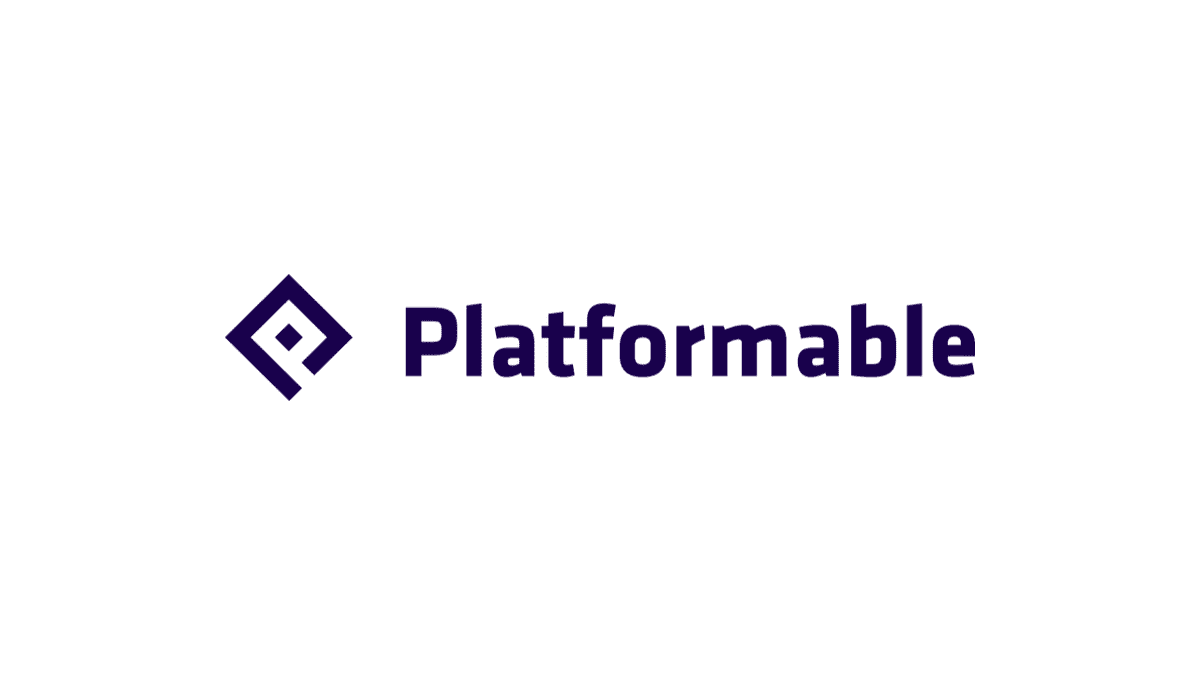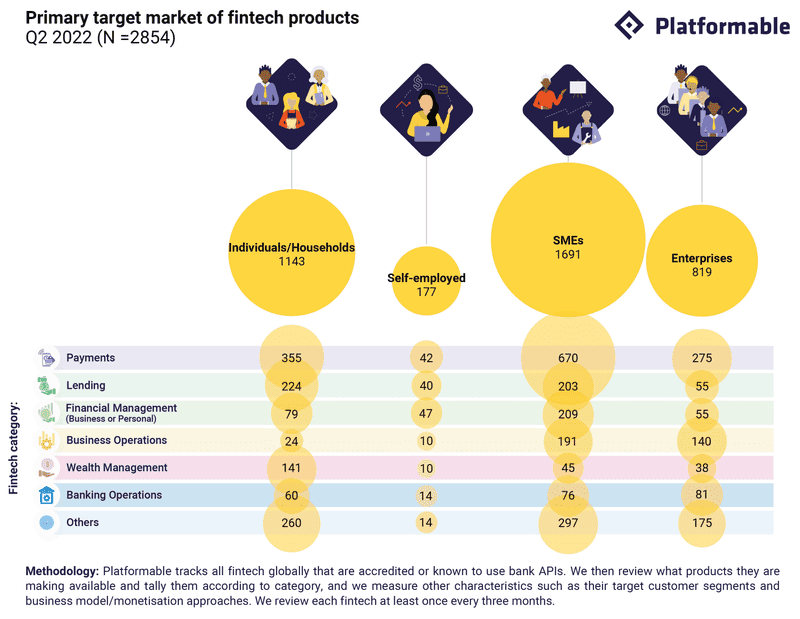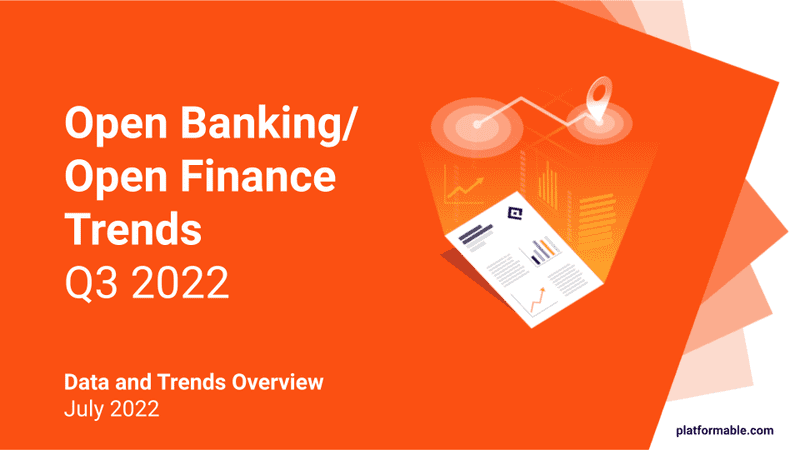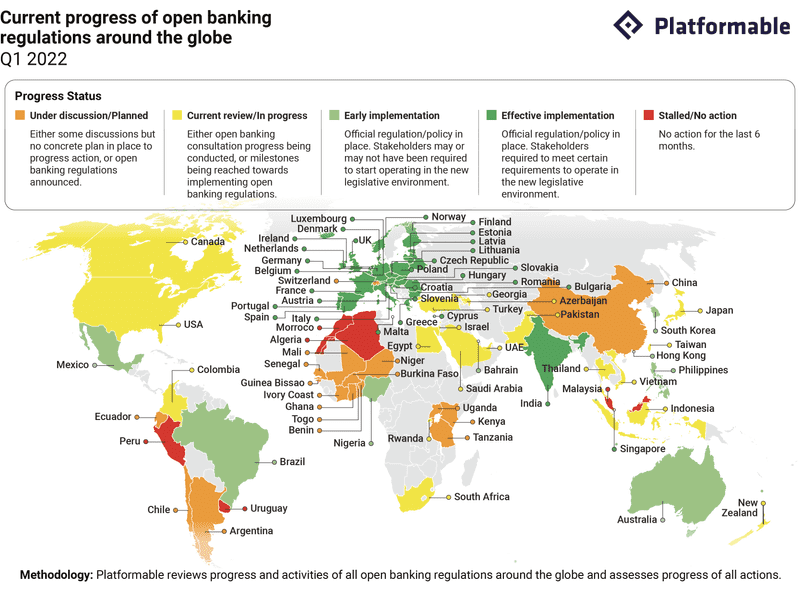Q4 2020 Open Banking API Trends: Meeting the needs of the under-served
11 min read

In Q4 2020, a number of activities demonstrate the work that needs to be done to ensure open banking can support the needs of the under-served.
To aid in better understanding of open banking impacts, we published our taxonomy defining the groups of under-served that we will measure in the open banking ecosystem.
These groups are:
- Low income consumers in low and middle income countries
- Low income and disenfranchised consumers, including some small businesses, in higher income countries
- Women, Indigenous, migrants, LGBT, people with disabilities, and non-white populations around the globe.
| Underserved group | What we will measure |
|---|---|
| Low income consumers in low and middle income countries |
|
| Low income and disenfranchised consumers, including some small businesses, in higher income countries |
|
| Women, migrants, Indigenous, LGBT, people with disabilities, and non-white populations around the globe |
|
Q4 Key Activities Addressing the Needs of the Under-served
In the following section, we look at one key event for each of the three under-served populations described above, that occurred in Q4.
15 October 2020: Impacts on consumers in low and middle income countries
We understand that businesses will make open APIs available as part of a platform approach when they see an economic opportunity to do so. API industry leaders like apidays founder Mehdi Medjaoui have previously joked that the success of an open platform is to have a closed API, that is, ecosystem stakeholders are able to grow and price value when there is information (or service) asymmetry. So providers that have market value in their data and digital systems will expose and monetise them via APIs.
In our definition of open ecosystems, we acknowledge that businesses will need to create pricing structures or otherwise manage access to their APIs in order to generate revenue either directly (via charging for API usage) or indirectly (by sharing APIs with partners and third parties that then bring new customers or new buyers to the API provider’s business). In open ecosystems, there is a level of access and availability that everyone should be able to receive as a member of the ecosystem.
For example, in the banking sector, the European Union has declared through the Second Payments Services Directive (PSD2) that all ecosystem stakeholders should be entitled to payments initiation and account information banking functionalities, and that access should be provided as part of creating a level playing field. Brazil’s new open banking regulations are more granular: they stipulate a level of access to core banking functionalities that should be provided free of charge to all market players as part of an open ecosystem, but beyond that, banks are able to charge for high volume uses.
(As a sidenote, it appears the proposed European Data Governance Act is preparing the way for a similar approach to open data, which we imagine will impact on the degree of openness of digital industry ecosystems. The proposed Governance Act suggests that European governments at all levels could impose pricing to access public (open data), in part to help cover the costs of maintaining data stores. Under the related Open Data and Public Sector Information Directive, the European Commission has already identified subject areas where “high value datasets” should be made available via API. Therefore, it appears the proposed European Data Governance Act is paving the way for governments that make high value datasets available via APIs to be able monetise them when they do become available.)
At Platformable, we believe that there should be a baseline of availability of open and free access to banking and finance APIs in order to increase financial inclusion opportunities and to disrupt how the traditional banking sector has marginalised of specific populations such as women, non-white populations in most countries, Indigenous people, LGBT-identifying citizens, people living in rural and remote areas, and people with disabilities.
In low and middle income countries, this free and open API access would also help reduce the risk that open banking and open finance API providers become value extraction platforms in which citizen and business financial transaction data is used by businesses in higher income countries without enabling local value generation.
For example, where financial services are provided by international API platforms, such as payments providers, the providers are collecting data on transactions and payments behaviours of local residents and local businesses:
- Because they are an international business without local offices or a local business presence, there may be tax implications whereby they are not paying taxes for digitally produced goods and services into the local economy.
- They may not be employing local staff so are not investing in local economic development through employment.
- They may be using the data from users of their platform to design other services and products, which again do not employ local staff or contribute to local taxes.
- If a local startup wants to use the payments providers APIs to create a locally relevant solution, they may have to pay API costs that price them out of the market, even though their third-party solution may have specifically been designed to address the unmet needs of local residents.

In Q4 2020, Stripe bought Nigerian payments startup Paystack. Paystack has seen rapid growth amongst Nigerian businesses, and is therefore collecting large amounts of data about online commerce in a region “growing 21% year-over-year, 75% faster than the global average”, according to Stripe. To their credit, Stripe has, at present, decided to maintain Paystack's operations as an independent business (they were an early investor in Paystack, in any case). But it is an example of value extraction risk, where over time, local Nigerian online economy data is extracted by Stripe, which is based in the United States. Other U.S. and international based platforms often start their acquisition by leaving it to run as an independent business, until they study and understand it and are able to merge it into their global operations.
Nigeria is one of the few countries in many low and middle income regions that has identified the risks to their tax base from the presence of global digital platforms. According to analysts at Sefton Fross, Nigeria’s Significant Economic Presence Order would require Stripe to pay local taxes even if they did not have an office in the country (which they do for now anyway with their Paystack acquisition).
December 2020: APIs directly responsible for bringing in 5,215 new customers to fintech per year
The Inclusive Fintech 50, a fascinating research report from the Center for Financial Inclusion was released in December 2020. While the report mostly focuses on mobile app-based fintech, we expect that in future years, several of the entries will describe fintech that are also operating as open API platforms, and fintech that make use of open banking APIs.
(Platformable is involved in a project with John Musser for the Consultative Group to Assist the Poor’s Open API Initiative. We help maintain the CGAP API Dashboard which maps the providers that are opening finance services APIs in low and middle income countries. We track how they are being used to create new financially inclusive products, and analyse the API strategies used by each.)

This year’s Inclusive Fintech 50 data shows that APIs are being used by fintech to build their user base. The data shows that fintechs that use APIs are directly reaching 5,215 new customers per year on average. Meanwhile, other technologies, such as machine learning and scoring algorithms would also require at least partner and private APIs to be used, even if they are not opened to the wider ecosystem, so APIs in general are also indirectly helping fintech acquire customers.
Notably, chatbots are helping fintech reach out to 7,110 new customers per year on average. The methodology for these calculations, it appears, comes from DFS Labs. Their 2019 study into the use of chatbots in low and middle income countries found that chatbots were being built by third parties using open SMS APIs. (We imagine that even where a bank or fintech was building their own chatbots, like with scoring algorithms and machine learning, they would need to leverage either partner or private APIs to do so.) This shows that messaging APIs, for example, may also need to be considered as part of the open banking and open finance API ecosystem. They support the development of new financial products, and enable users to interact with financial services, and are becoming an essential enabler of new financial inclusion product development. Overall the research shows that APIs are making an impact in helping under-served populations in low and middle income countries gain access to financial services, but often this occurs outside the open banking ecosystem.
18 December 2020: Impacts on women, migrants, LGBT, and non-white populations around the globe
Accurate and disaggregated data on business registrations will be essential to measure the distributive value of open ecosystems.
For example, in order to accurately measure whether open banking ecosystems are enabling financial participation of women-, Indigenous-, LGBT-, and migrant-owned businesses, there needs to be some ability to record data on business ownership demographics. Europe is a poor data collector on being able to measure whether policy impacts are benefiting non-white, and non-European-born citizens.
At the tail end of Q4 2020, the European Commission invited feedback on a draft financial transparency initiative.
At Platformable, as an emerging data startup, our business model requires access to business registration data that can be disaggregated by demographics of business ownership (and preferably management teams as well).
We measure the value of open ecosystems, and the potential for all stakeholders to participate and co-create. When mapping the open banking ecosystem, we want to measure whether open banking is enabling access to new financial services, such as financing and lending, to those businesses that are under-served by traditional banking systems. For example, women-owned and migrant-owned businesses are often economic powerhouses, averaging much higher revenue, and employing more local workers than white, male-owned businesses in their equivalent industry. However, at the European-level, there is no visibility on whether women and migrant-owned businesses are able to access financing at the same level as other businesses. The European Commission’s SAFE dataset, which regularly measures SME financing experiences, does not disaggregate data by owner or management demographic characteristic, so it is unclear whether SME financing mechanisms, including those that are enabled via open banking APIs, are creating more inclusive opportunities.
Platformable submitted a response to the European Commission’s financial transparency consultation to highlight this information gap. We advocated that:
- All company data must include characteristics on founder, management and staff complements in terms of sex/gender, race, ethnicity and migrant status
- Business and company data systems should be built using standards such as the OpenAPI Specification Standard
- Access to information via API should be free
- The value of opening this data should be measured.
Our full submission is available from the European Commission’s consultation page, but we have also created a working copy (shown embedded below), with comment functionality turned on, so if you feel like sharing your feedback on our response, it would be great to have a discussion. Feel free to comment directly on the document, so that we can consider your feedback for similar consultations in future. For example, the UK’s Office for National Statistics is conducting a survey on inclusive data in Q1 2021.
We'd also love to have a chat about these data points and our continued work on measuring open banking and open finance impacts on the under-served. Please feel free to book a time with our team via our Calendly:




